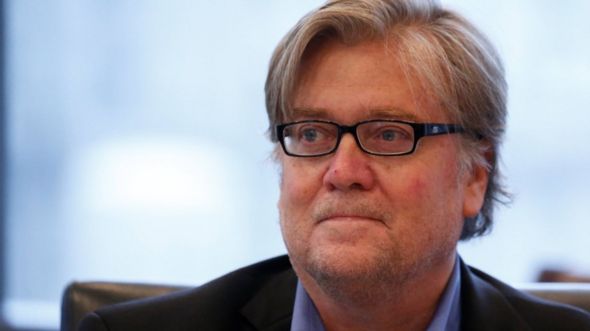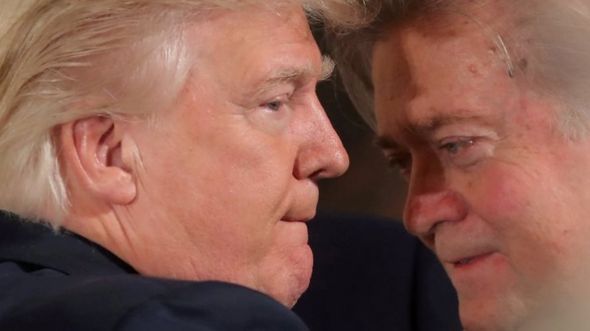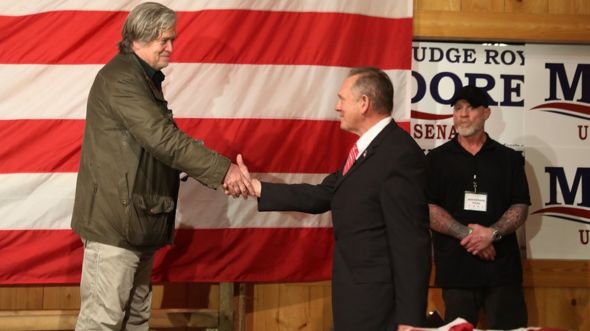Steve Bannon: Who was Trump's key adviser?
Steve Bannon was the driving force behind the right-wing Breitbart News website before emerging as one of the key players in Donald Trump's White House.
He served as chief strategist, a role that gave him a direct line to President Trump, and his influence was discerned in key decisions, before he left his post in August 2017.
Well, that was what everyone thought until President Trump's astonishing barrage against Mr Bannon in early January 2018.
Disparaging his former aide as a serial false news leaker who was rarely in one-on-one meetings with him, Mr Trump said Mr Bannon "now pretends to have had influence to fool a few people".
Mr Bannon had been front-and-centre for such events as the US withdrawal last June from the Paris climate agreement - one of his own top policy objectives.
But in truth the relationship between the two men was by then already cooling rapidly.
In April, Mr Trump had declined to affirm that Mr Bannon still had his support, removing him from his elevated role on the crucial National Security Council.
He appeared to downplay Mr Bannon's role, declaring in a New York Post interview: "I'm my own strategist".
'Bannon the Barbarian'
Mr Bannon then kept a somewhat lower profile and talk of his impending removal swirled.
There were reports of a power struggle with Mr Trump's son-in-law and senior adviser, Jared Kushner, and discord with Gary Cohn, the director of the president's National Economic Council.
But it may have been his feud with National Security Adviser HR McMaster that was the most telling and when the end came, in August, it was unsurprising.
Mr Trump himself had reportedly grown weary at the press leaks and of Mr Bannon taking credit for his election victory.
Still, straight after he left, Mr Bannon headed back to Breitbart and vowed he would go to war against the president's opponents .
"I've got my hands back on my weapons," he said. "It's Bannon the Barbarian."
But the schisms started to show.
Mr Bannon said Mr Trump's firing of the FBI's director had been the biggest mistake in "modern political history" .
Mr Bannon told CBS News if James Comey had not been sacked, a special counsel would not have been appointed to probe alleged Russian election meddling.
But it was his fierce support of controversial Alabama Senate candidate Roy Moore that caused the biggest rupture in his relationship with the president.
Although the president eventually backed Mr Moore's candidacy, he said after the staunchly Republican seat was lost to the Democrats that he knew Mr Moore would be beaten.
The Republican Party lashed out at Mr Bannon , although the New York Times said Mr Trump still saw him as a human shield to absorb criticism .
The last straw appeared to be when Mr Bannon was quoted in a new book as describing a meeting between Mr Trump's son and a group of Russians as "treasonous".
"Steve Bannon has nothing to do with me or my presidency. When he was fired, he not only lost his job, he lost his mind," Mr Trump said in a statement .
'Not warm and fuzzy'
Born in Virginia in 1953, Mr Bannon spent four years in the navy before completing an MBA at Harvard. He then went into investment banking and, after a spell with Goldman Sachs, moved successfully into media financing, helping to get the comedy show Seinfeld, among others, off the ground.
He shifted into film production, working in Hollywood before branching out into independent political documentary making, paying homage to former US President Ronald Reagan, former Alaska Governor Sarah Palin and the Tea Party movement.
Through this work he met Andrew Breitbart, a staunchly conservative media entrepreneur who wanted to create a site that challenged what he saw as liberal-dominated mainstream media.
When Breitbart died of a heart attack in 2012, Mr Bannon took over as head of Breitbart News and drove it forward










تعليقات: (0) إضافة تعليق
اترك تعليقا وشاركنا رأيك